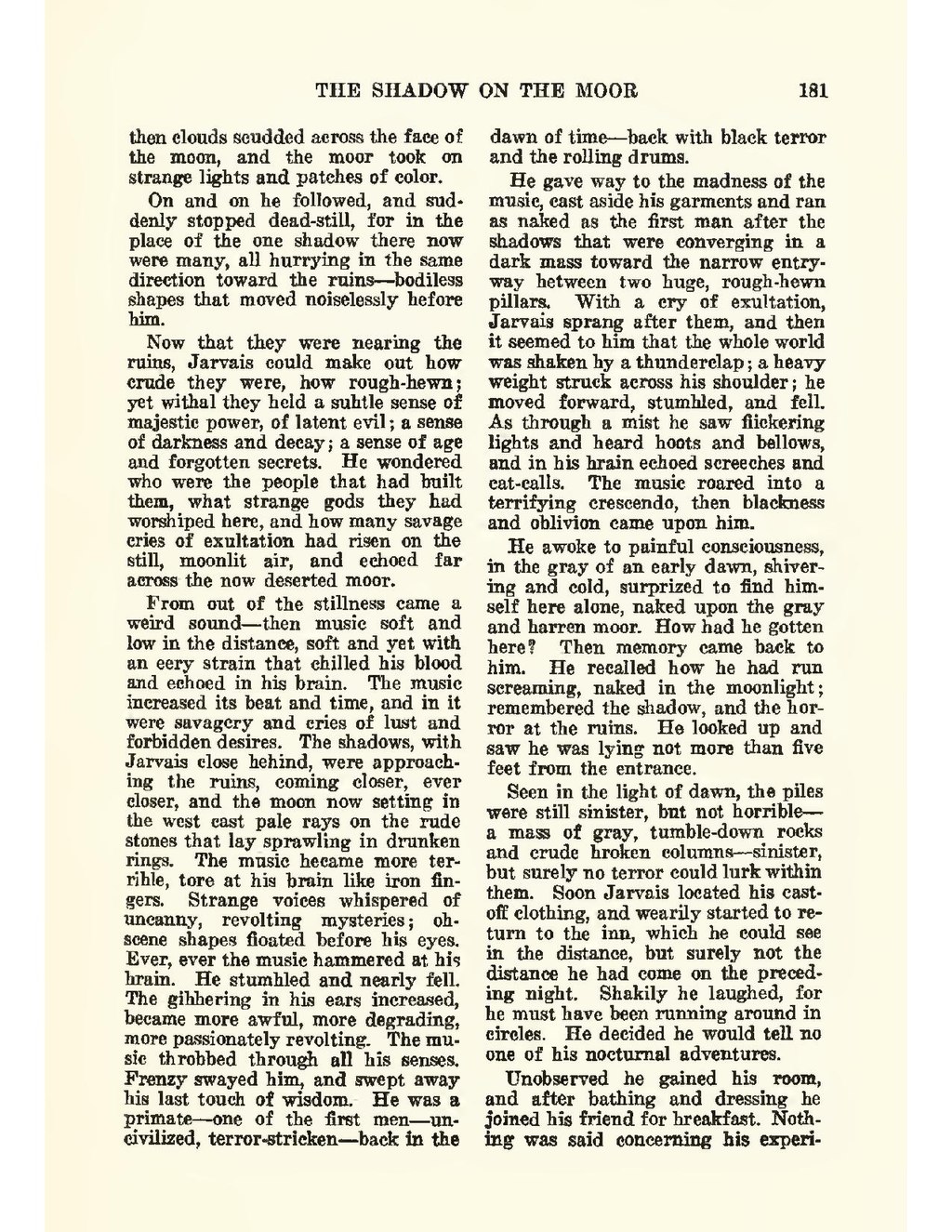then clouds scudded across the face of the moon, and the moor took on strange lights and patches of color.
On and on he followed, and suddenly stopped dead-still, for in the place of the one shadow there now were many, all hurrying in the same direction toward the ruins—bodiless shapes that moved noiselessly before him.
Now that they were nearing the ruins, Jarvais could make out how crude they were, how rough-hewn; yet withal they held a subtle sense of majestic power, of latent evil; a sense of darkness and decay; a sense of age and forgotten secrets. He wondered who were the people that had built them, what strange gods they had worshiped here, and how many savage cries of exultation had risen on the still, moonlit air, and echoed far across the now deserted moor.
From out of the stillness came a weird sound—then music soft and low in the distance, soft and yet with an eery strain that chilled his blood and echoed in his brain. The music increased its beat and time, and in it were savagery and cries of lust and forbidden desires. The shadows, with Jarvais close behind, were approaching the ruins, coming closer, ever closer, and the moon now setting in the west cast pale rays on the rude stones that lay sprawling in drunken rings. The music became more terrible, tore at his brain like iron fingers. Strange voices whispered of uncanny, revolting mysteries; obscene shapes floated before his eyes. Ever, ever the music hammered at his brain. He stumbled and nearly fell. The gibbering in his ears increased, became more awful, more degrading, more passionately revolting. The music throbbed through all his senses. Frenzy swayed him, and swept away his last touch of wisdom. He was a primate—one of the first men—uncivilized, terror-stricken—back in the dawn of time—back with black terror and the rolling drums.
He gave way to the madness of the music, cast aside his garments and ran as naked as the first man after the shadows that were converging in a dark mass toward the narrow entryway between two huge, rough-hewn pillars. With a cry of exultation, Jarvais sprang after them, and then it seemed to him that the whole world was shaken by a thunderclap; a heavyweight struck across his shoulder; he moved forward, stumbled, and fell. As through a mist he saw flickering lights and heard hoots and bellows, and in his brain echoed screeches and cat-calls. The music roared into a terrifying crescendo, then blackness and oblivion came upon him.
He awoke to painful consciousness, in the gray of an early dawn, shivering and cold, surprized to find himself here alone, naked upon the gray and barren moor. How had he gotten here? Then memory came back to him. He recalled how he had run screaming, naked in the moonlight; remembered the shadow, and the horror at the ruins. He looked up and saw he was lying not more than five feet from the entrance.
Seen in the light of dawn, the piles were still sinister, but not horrible—a mass of gray, tumble-down rocks and crude broken columns—sinister, but surely no terror could lurk within them. Soon Jarvais located his castoff clothing, and wearily started to return to the inn, which he could see in the distance, but surely not the distance he had come on the preceding night. Shakily he laughed, for he must have been running around in circles. He decided he would tell no one of his nocturnal adventures.
Unobserved he gained his room, and after bathing and dressing he joined his friend for breakfast. Nothing was said concerning his experi-
